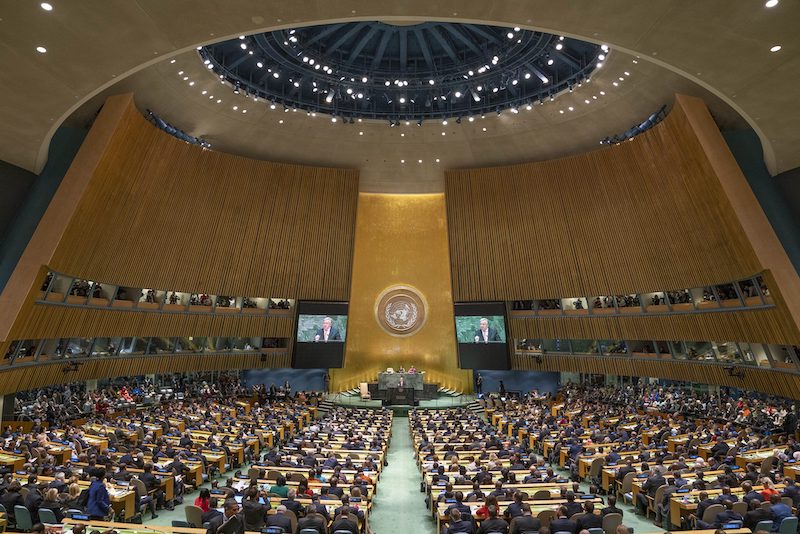Here’s what The Tyee learned from inside the General Assembly in New York.

Even though the UN Summit didn’t deliver commitments of a scale necessary to stave off global catastrophe, there were plenty of significant announcements. Photo via the UN.
Prime Minister Justin Trudeau was nowhere to be seen among the dozens of world leaders and executives who on Monday made speeches to the United Nations about solving the climate emergency.
Technically that’s because Canada is in the midst of a federal election. But it’s unclear if the Trudeau government, which is a long way from meeting the climate targets it agreed to at the 2015 Paris talks, would have otherwise met the UN’s criteria. More than 50 countries were reportedly rejected from addressing the Climate Action Summit because the plans they presented weren’t ambitious enough.
Even with this criteria, however, the consensus among experts and observers was that world leaders failed to make commitments strong enough to achieve the 50 per cent reduction in greenhouse gas emissions that scientists calculate is necessary to give us a fighting chance of stabilizing the climate at 1.5 degrees Celsius….
Yet the event contained important lessons for Canada — and for whoever is elected to lead it after the October election. Here are three of the biggest takeaways.
1. Young people are extremely pissed at political leaders
Early in the day, 16-year-old Swedish climate change leader Greta Thunberg made one of the most fiery and emotional speeches of her life. “We are in the beginning of a mass extinction. And all you can talk about is money and fairy tales of eternal economic growth. How dare you?” she told the room with her voice on the edge of tears. “If you choose to fail us, I say we will never forgive you. We will not let you get away with this.”…
2. The excuses for delaying climate progress are shrinking
Even though the UN Summit didn’t deliver commitments of a scale necessary to stave off global catastrophe, there were plenty of significant announcements. Sixty-five countries — including Switzerland, Costa Rica, Ethiopia and others across the development spectrum — are pledging to get bolder and stronger in their official greenhouse gas-fighting plans. Nearly 90 companies, which together have a market capitalization of over US $2.3 trillion, committed to actions that could align their carbon footprints with a pathway to 1.5 C. …
3. The era of Big Oil’s dominance isn’t over — but it could be soon
Though oil and gas producers were not visible at the Summit, their influence is all over the UN climate negotiations process, whether in the failure of the Paris treaty to once mention fossil fuels or the overtures made to companies by the UN Secretary-General Antonio Guterres and his representatives.
Yet the rapid growth of electric vehicles and other alternatives to fossil fuels poses a growing economic threat to Big Oil. So far investors aren’t fleeing. But serious commitments from world leaders — such as a coordinated global effort to phase-out combustion engine vehicles — could rapidly change the financial calculus for investors in oil and gas, particularly in Canada’s high-cost oil sands. MORE
